
eco Complaints Office
Combatting Illegal Internet Content and Dedication to Youth Media Protection

Since 1996, we at the eco Complaints Office have been fighting successfully against illegal content on the Internet and are committed to ensuring that illegal content is taken down and criminal offences are reported to the authorities. In fulfilling this commitment, cooperation with the various stakeholders and neutral and transparent processes are of equal importance.
Our work is based on voluntary cooperation with society as a whole, and its fundament is that of self-regulation of providers and the engagement of Internet users. From the outset, eco has cooperated with law enforcement agencies in the fight against child sexual abuse material and other illegal Internet content.
We are also the contact partner for eco members, the state, society and politics.
Internet users can report suspected illegal Internet content to the eco Complaints Office, free of charge and anonymously: for example, under international.eco.de/eco-complaints-office. he Complaints Office’s lawyers then assess whether the reported content violates German law and take appropriate measures if necessary.
The eco Complaints Office can also be reached via the portal https://www.internet-beschwerdestelle.de/en, which it operates together with the German Association for Voluntary Self-Regulation of Digital Media service providers (FSM), as well as via the German information platform for young people jugend.support.
2022 Statistics
In 2022, a total of 18,110 complaints were reported on potentially criminal content or violations of the youth media protection provisions. Almost half of these reports were “actionable” complaints.
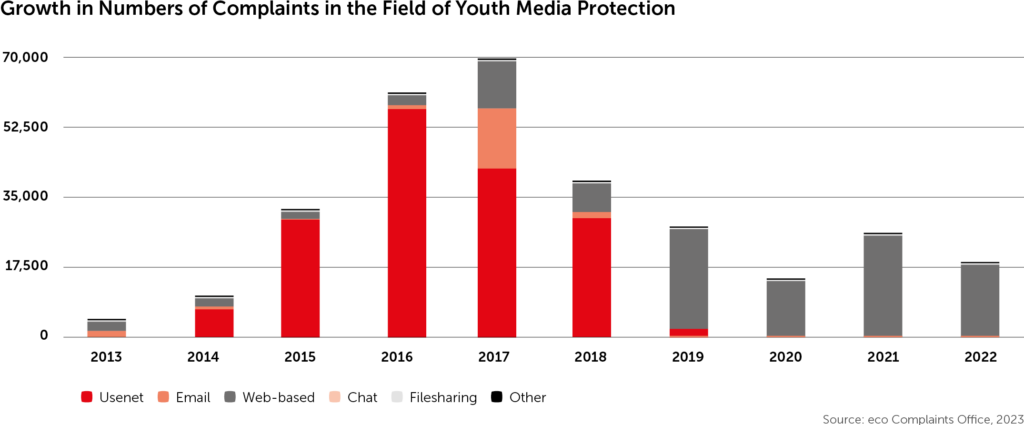
With 8,904 cases in 2022, the eco Complaints Office recorded a new peak in actionable complaints. This was a slight increase of 3.4 per cent compared to the previous year.
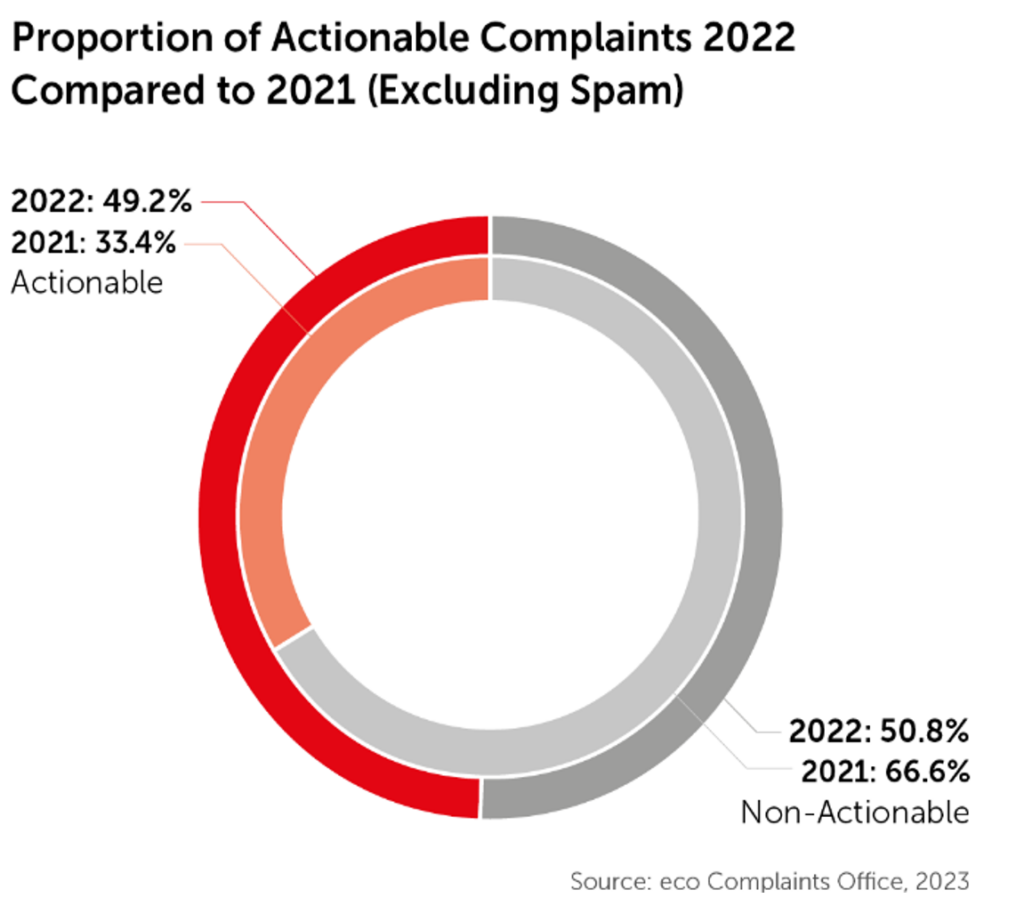
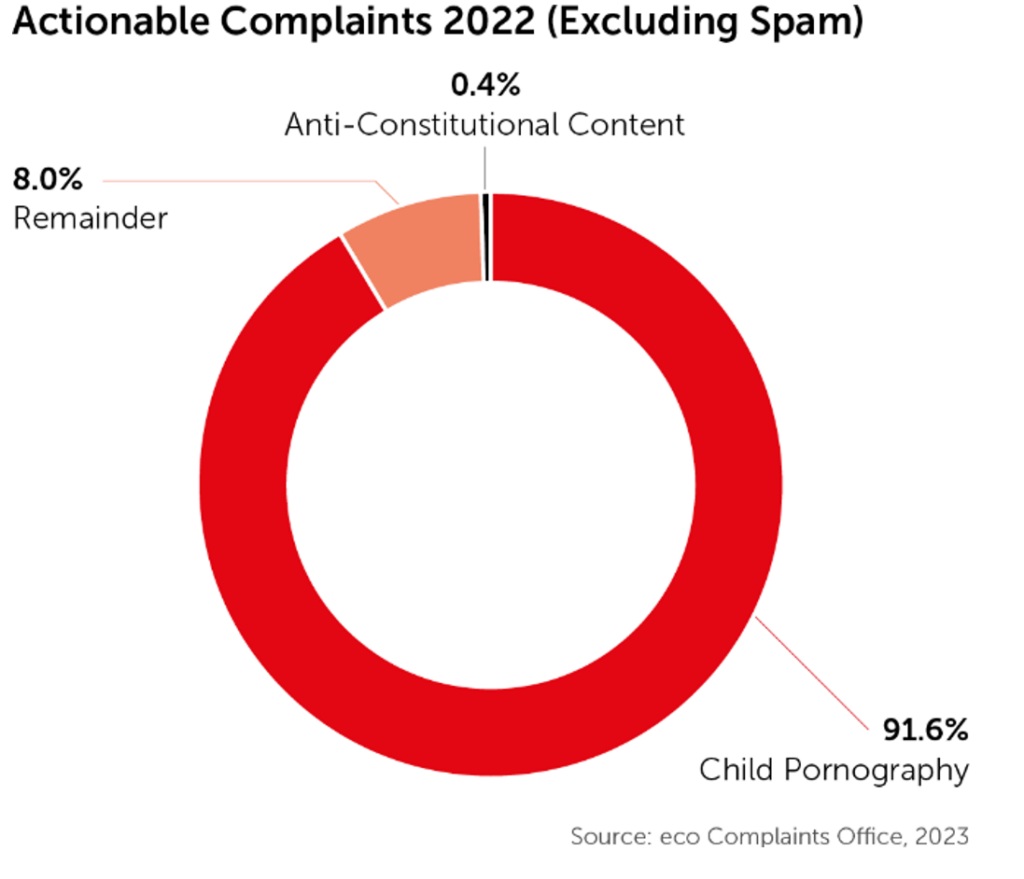
The actionable complaints were forwarded – depending on the type of violation and server location – to law enforcement agencies, content providers, host or platform providers and/or members of the INHOPE network.
In terms of content, the majority of complaints concerned depictions of the sexual abuse and sexual exploitation of minors, defined as Child Pornography in Section 184b of the German Criminal Code. The proportion of anti-constitutional content was again strikingly low, comprising 0.37 per cent of all actionable complaints.
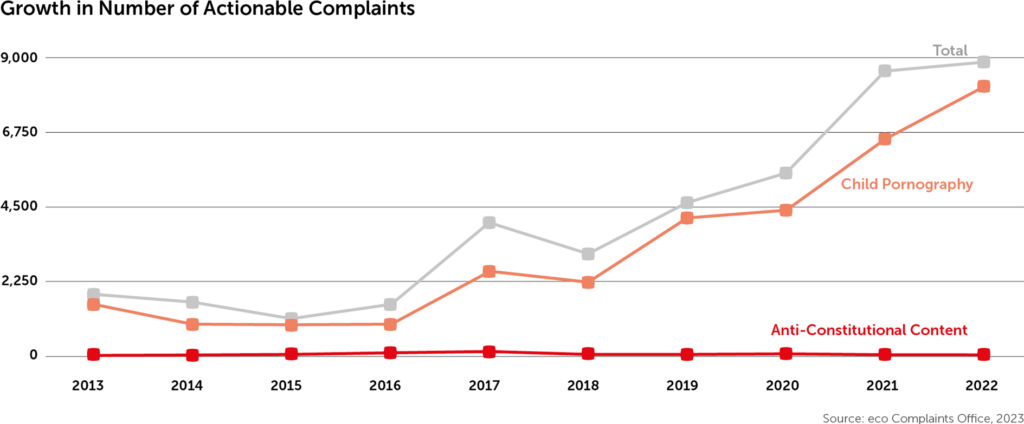
The take-down times for depictions of sexual abuse of children remained consistently short in Germany: Websites with Child Pornography hosted in Germany were offline (“taken down”) within 2.83 days on average, whereas globally it took 7.91 days.
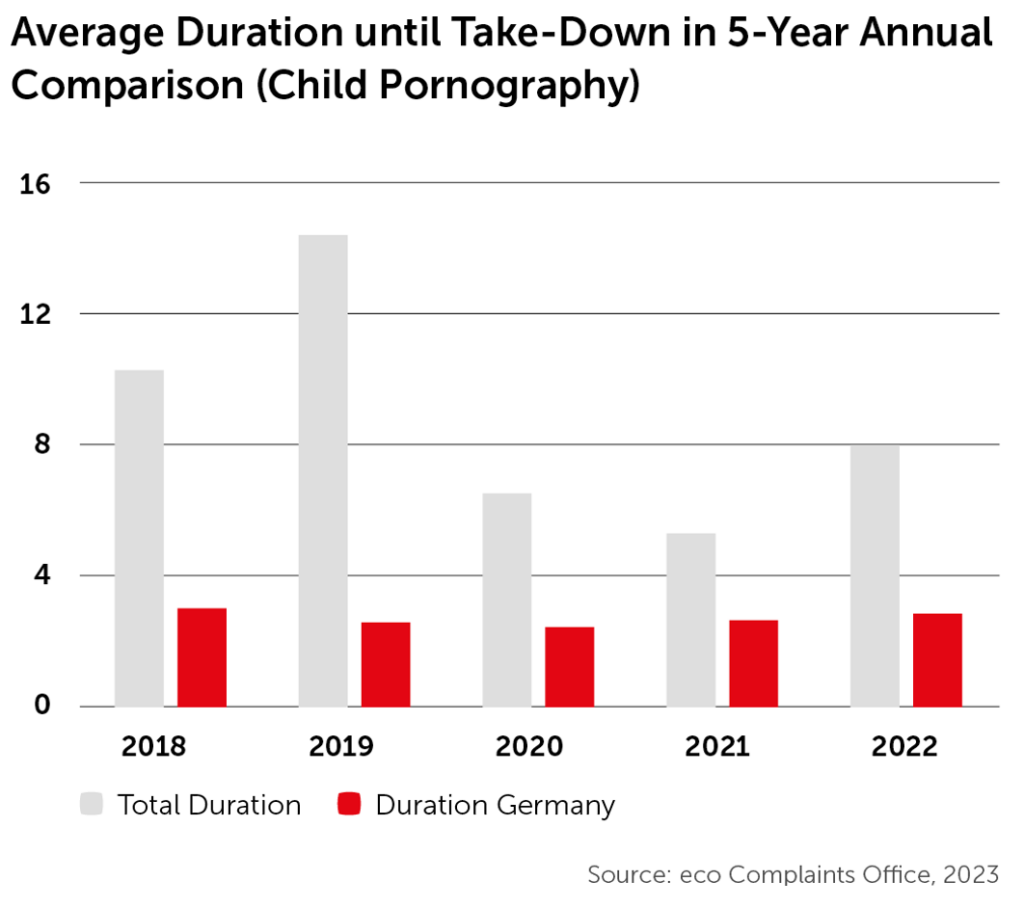
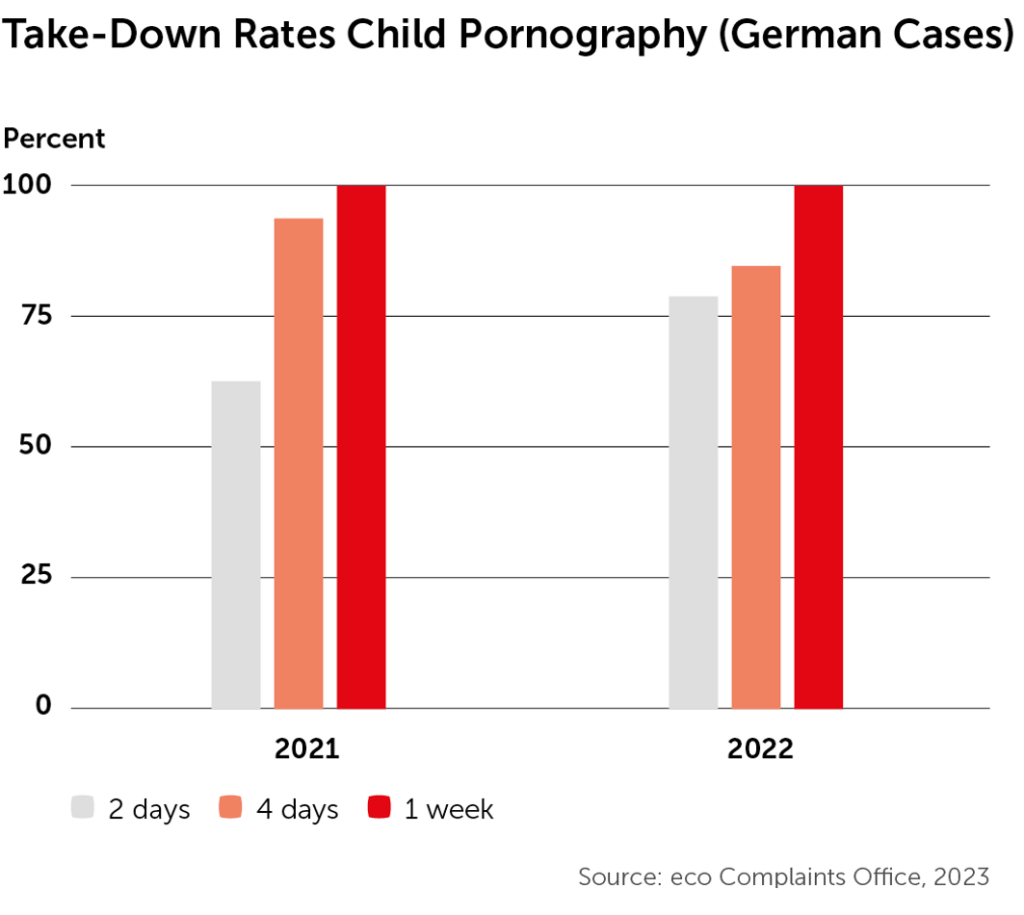
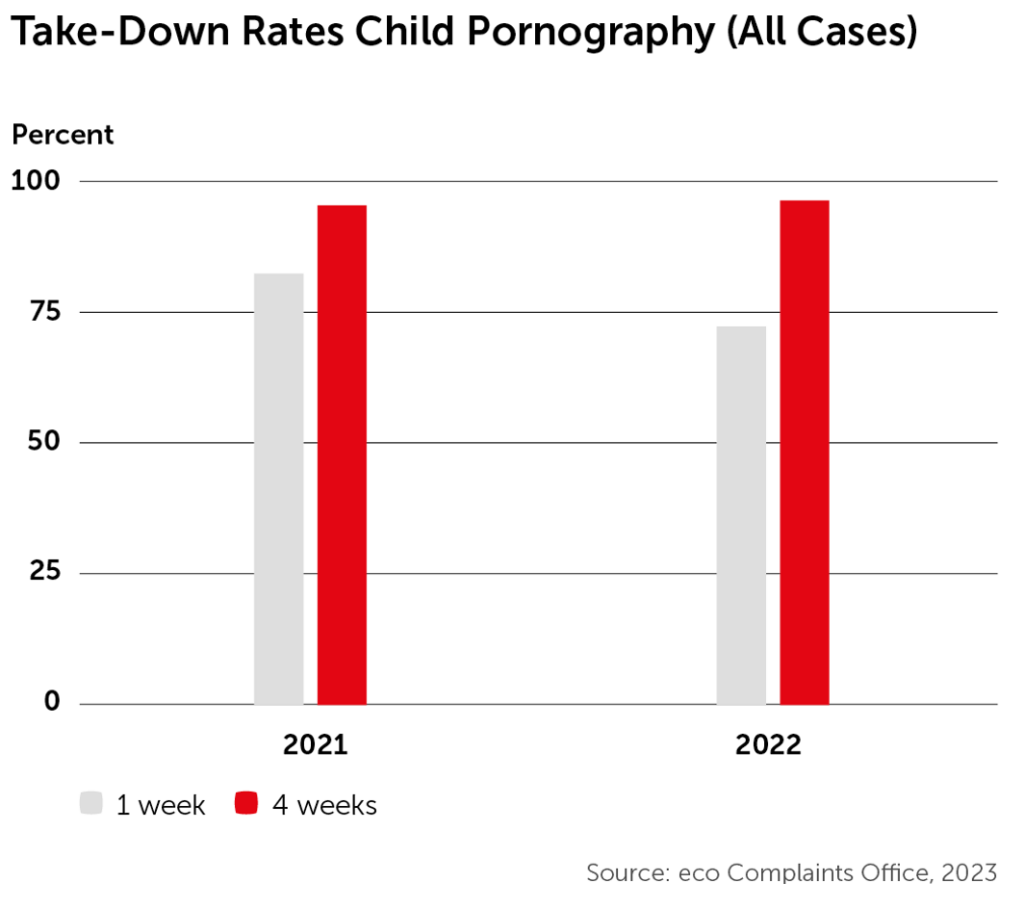
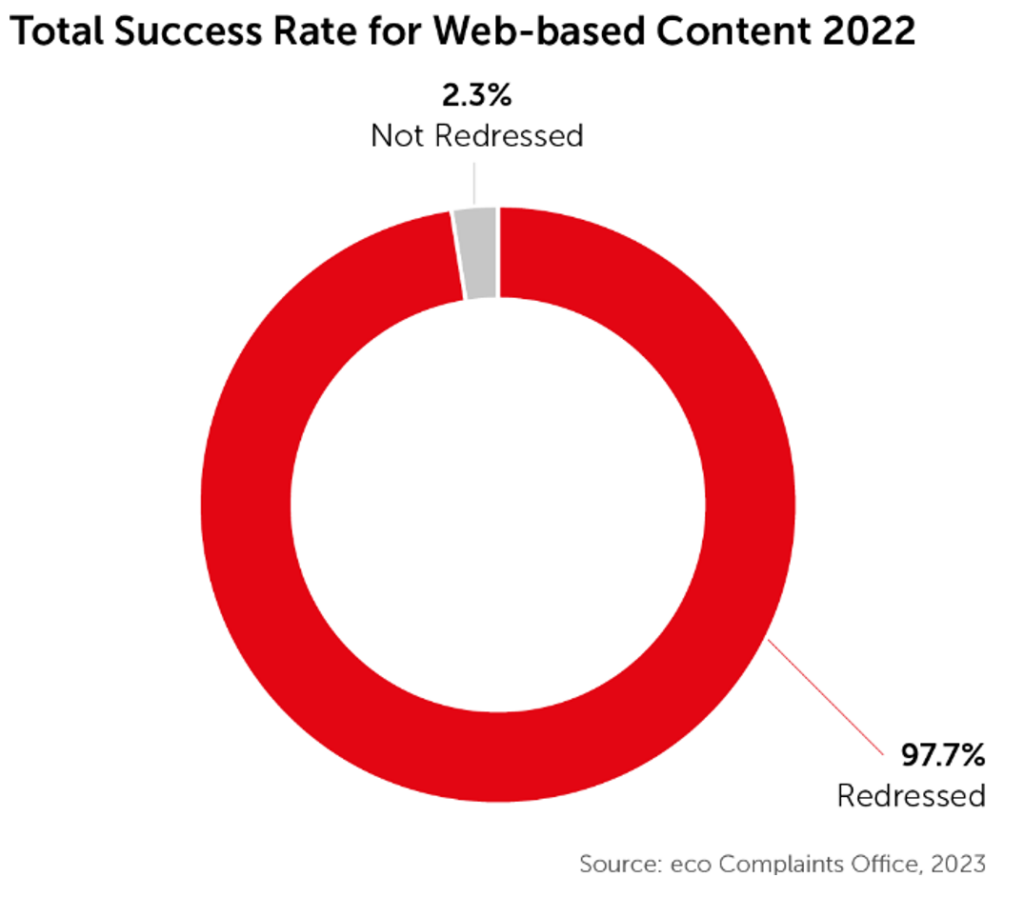
A total of 97.7 per cent of the illegal Internet content reported upon by the eco Complaints Office –such as depictions of sexual abuse, incitement of the masses, and depictions of violence – were removed worldwide. This demonstrates once again that self-regulation works – also internationally.
Network and committee work/political engagement in 2022: an excerpt
INHOPE
INHOPE (International Association of Internet Hotlines, www.inhope.org) is the international umbrella organisation of Internet hotlines that handle complaints concerning depictions of the sexual abuse of minors. Founded in 1999, among others by eco, it has grown to encompass 50 hotlines in 46 countries.
In terms of content, the network continued to place a focus on the exchange of information on working approaches, technical developments to support complaint handling, and staff welfare in 2022. In addition, the exchange of experience between the hotlines was promoted by financial assistance for visits to partner hotlines. The eco Complaints Office also benefited from this: both as a host for colleagues from Luxembourg and Belgium, and as a visitor at the Irish hotline. In addition, the implementation of the new European “CSAM Strategy” remained an important topic of the network’s activities, with the eco Complaints Office actively participating in the INHOPE Policy Task Group.
Since June 2018, Peter-Paul Urlaub, eco Complaints Office Consultant, has been a member of the INHOPE Board; he currently holds the role of Treasurer.
Safer Internet Centre Deutschland
As (co-)operator of the portal www.internet-beschwerdestelle.de/en, the eco Complaints Office has been part of the German Safer Internet Centre (www.saferinternet.de) since 2008. Alongside eco, other members of the Safer Internet Centre are the FSM, jugendschutz.net, “Nummer gegen Kummer”, and klicksafe.de (operated by the Rhineland-Palatinate State Media Commission and the North Rhine-Westphalia Media Authority
Within the framework of this cooperation, on the occasion of the European Day for the Protection of Children against Sexual Exploitation and Abuse on 18 November 2022, the eco, FSM and jugendschutz.net hotlines published several short information videos on the topic of sexualised violence against children and young people on the Internet, including available options for action if confronted with such content on the Internet.
Also in 2022, the German Safer Internet Centre continued to receive financial support from the European Union – in the first quarter, from the EU’s “Connecting Europe Facility” fund and, subsequently, from the “Digital Europe Programme”.
Cooperation on youth media protection with other relevant actors
In addition, the eco Complaints Office cooperated with other relevant actors in the field of youth media protection.
In continuing to build on the work of previous years, cooperation on general and specific topics was extended with supervisory and self-regulatory bodies. Examples include the participation of representatives of the Media Authority of North Rhine-Westphalia (LfM) in the eco Complaints Office event on the occasion of Safer Internet Day 2022, as well as work undertaken by staff of the eco Complaints Office as youth protection experts for the Entertainment Software Self-Regulation Body (USK). The Complaints Office also cooperated with the LfM as part of the initiative “Prosecute, don’t just delete”.
The eco Complaints Office also participated in the “SIKID Forum on Interaction Risks” on 27 and 28 June 2022. The SIKID project, which has been funded by the German Federal Ministry of Education and Research (BMBF) since September 2021, is dedicated to current issues of security for children in the digital sphere and aims to improve regulation, to connect stakeholders, and to implement children’s rights. In addition, low-threshold security instruments and youth protection concepts for the Internet are to be developed, based on an approach on children’s rights.
In 2022, “trusted flagging/reporting” was also an essential element of the eco Complaints Office’s effective work. The special reporting channels for trustworthy whistleblowers enable direct interaction between hotlines and providers, which simultaneously has a positive effect on reaction times.
Law enforcement agencies
Law enforcement is an important element in combatting illegal Internet content. The eco Complaints Office works within the framework of complaint processing to ensure that illegal content is taken down and that criminal offences are reported. Beyond complaint processing, the Complaints Office also cooperates with law enforcement agencies at both the federal and state levels.
In the fight against depictions of the sexual abuse of children, close and effective cooperation with the German Federal Criminal Police Office (BKA) takes place, with this also reflected in the German federal government’s report on the success of deleting Child Pornographic web content. The most recent report, published in August 2022, once again showed that the principle of “take-down instead of blocking” and the cooperation of the hotlines, the BKA and the Federal Agency for the Protection of Children and Young People in the Media (BzKJ) present very effective means for combatting illegal Internet content.
In the area of state protection offences, the eco Complaints Office cooperates with police authorities and public prosecutor offices at both the federal and state levels. Since 2019, eco has also been a member of the North Rhine-Westphalian initiative “Prosecute, don’t just delete”, and thereby actively supports the rigorous criminal prosecution of hate speech on the Internet.
In addition, the collaborative work between the Complaints Office and the police at state level is part of a cooperation agreement between eco, Networker NRW and the North Rhine-Westphalia Criminal Police Office (LKA NRW).
Amendment to the protection of minors in the media
The amendment of the German Interstate Treaty on the Protection of Minors in the Media (JMStV), which was instigated by a discussion draft in spring 2020, once again became the subject of political-regulatory discussions in the year under review. On 15 March 2022, the Broadcasting Commission of the German Federal States adopted concrete proposals for an amendment to the JMStV. The core of the project is the further development or reform of the technical protection of minors in the media by supplementing existing systems with device-based or operating system-based solutions for the protection of minors and for configuration options.
Within what was referred to as “online participation”, associations, companies and individuals from the media industry, public broadcasters and citizens were then called upon to comment on the reform of the German Interstate Treaty on the Protection of Minors in the Media (JMStV). As eco has critical insights regarding the published proposals, we used the online participation to point out existing concerns as well as implementation problems and effects or side-effects on the practical situation. Open questions were also addressed.
Since summer 2022, the submitted comments/inputs have been evaluated by the state and senate chancelleries of the federal states.
CSAM Regulation
From a regulatory perspective, the European Commission’s proposal for a “Regulation on laying down rules to prevent and combat child sexual abuse” (CSAM Regulation) was the eco Complaints Office’s primary topic in 2022. In addition to new obligations for providers, especially hosting providers or providers of interpersonal communication services, the regulation proposes the foundation and establishment of what are referred to as competent or coordinating authorities in the Member States, as well as a so-called “EU Centre.” The establishment of new, specific bodies could have an impact on the work and the network of the established hotlines. Due to the “affectedness” on the member companies and established hotlines, this European planned legislation is therefore of particular significance for eco as a stakeholder and as a hotline operator.
The eco Complaints Office has highlighted the existing concerns and ambiguities regarding the Commission’s draft in multiple ways and has correspondingly engaged with relevant actors. For example, the Complaints Office participated in a virtual meeting of the Global Encryption Coalition on the planned CSAM Regulation and also brought eco’s assessment of the regulatory proposal to meetings of the EurolSPA Safer Internet Committee. In addition, eco also held webinars on the CSAM Regulation in October in order to discuss selected provisions with various external experts and, by conveying factual knowledge, to enable propositions for the further legislative debate to be generated. On 15 November 2022, there was also an in-person meeting with the personal assistant of MEP Javier Zarzalejos, who is the rapporteur for the CSAM Regulation in the lead LIBE Committee.
Annual Report of the eco Complaints Office
Transparency is essential for the work of a hotline. With this being the case, in March and April 2022, we launched the sixth independent Annual Report of the eco Complaints Office in the framework of respective virtual press and policy briefings in German and English. Ms. Winkelmeier-Becker (Member of the German Bundestag and Chair of the Legal Affairs Committee), Ms. Martina Link (Vice President of the German Federal Criminal Police Office) and June Lowery-Kingston (European Commission, Head of Unit DG CONNECT, G3, Accessibility, Multilingualism, Safer Internet) contributed key speeches to complement the presentations of the Annual Report.
Youth Media Protection Expert Lunch & eco Youth Protection Officer Service
The portfolio of the eco Complaints Office is rounded off by individual services in the area of youth media protection that are offered independently of the general complaints work. As such, when it comes to assessing online offers and necessary measures, members can benefit both from the Complaints Office’s fully legally qualified personnel and its circa 25 years of expertise in the field of youth media protection.
Youth Media Protection Expert Lunch
With the “Youth Media Protection Expert Lunch”, the eco Complaints Office offers an open forum targeted exclusively at association members who are active in the field of youth media protection, with the aim of enabling the exchange of experiences and sharing information.
Two to three planned meetings are held per year, with additional relevant parties and external experts sometimes also invited to contribute.
eco Youth Protection Officer Service
The roles and functions of the youth protection officers are:
- Advising the provider
- Contact person for users
- Point of contact for official oversight
Youth protection on the Internet is a task for society as a whole. With the eco Youth Protection Officer Service, eco members have the opportunity to make their contribution to this cause. Certain telemedia providers with content that is developmentally impairing or youth endangering, as well as providers of search engines, may also be obliged to appoint a Youth Protection Officer in accordance with Section 7 of the German Interstate Treaty on the Protection of Minors in the Media (JMStV).
With the eco Youth Protection Officer Service, the eco Complaints Office comprehensively supports telemedia providers in the implementation of this obligation or in the voluntary appointment of a Youth Protection Officer. The service offers the following functions and benefits:
- Comprehensive consultation on matters relating to youth protection
- A neutral point of contact vis-à-vis users
- A minimisation of liability risk
- Prevention of official fines and written warnings
- An increase in user trust through effective youth protection
- Current information and updates on developments and legal changes in the area of youth media protection
Further information on the working approach, statistics and services of the eco Complaints Office is available at: international.eco.de/eco-complaints-office, as well as in the eco Complaints Office Annual Report 2022.